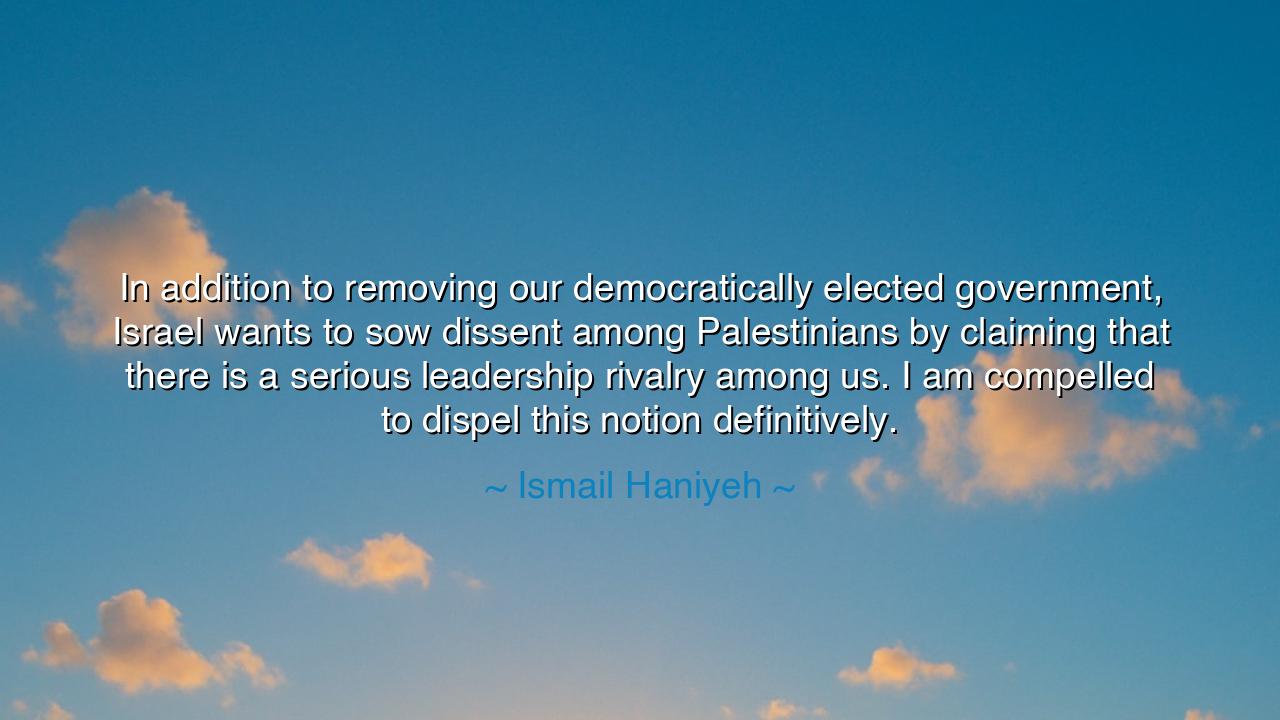
In addition to removing our democratically elected government
In addition to removing our democratically elected government, Israel wants to sow dissent among Palestinians by claiming that there is a serious leadership rivalry among us. I am compelled to dispel this notion definitively.






“In addition to removing our democratically elected government, Israel wants to sow dissent among Palestinians by claiming that there is a serious leadership rivalry among us. I am compelled to dispel this notion definitively.” Thus spoke Ismail Haniyeh, a figure shaped by the crucible of conflict, in a time when the cries of his people rose like smoke over a divided land. His words are not only a defense of political unity but a cry of the heart — a plea against the division that weakens the oppressed and strengthens the hand of those who rule over them. In this statement, Haniyeh touches upon an eternal theme known across all ages and nations: that unity is the fortress of the weak, and division is the weapon of the strong.
The meaning of his declaration is both simple and profound. He warns that power, when challenged, often turns to deception. The conqueror need not always fight with armies; sometimes it fights with rumors. To “sow dissent” is to plant suspicion in the soil of solidarity, to whisper into the ears of brothers that they are enemies, and to make one people believe they are divided when in truth they are one. Haniyeh, in speaking these words, seeks to guard the spirit of Palestinian unity, which for him is not merely political but existential — for a people that are divided within cannot stand without.
This pattern, however, is not new. It is a tactic as old as empire itself. The Romans once ruled the world not merely with legions but with cunning; they practiced the art of “divide et impera” — divide and rule. By turning tribes, provinces, and leaders against one another, they conquered nations far larger than themselves. So too did colonial powers in later centuries use the same method, drawing lines across lands and hearts, teaching neighbors to distrust neighbors. The same struggle Haniyeh describes is the one that has played out across the ages: the struggle not only against the oppressor’s sword but against the seed of division he plants in the heart of the oppressed.
In his words, there is also a profound assertion of identity. When he says, “I am compelled to dispel this notion definitively,” he speaks not only as a leader defending his government but as a man defending the dignity of his people. For in a land torn by war and occupation, to preserve unity is to preserve hope. The democratically elected government he speaks of is, to him, a symbol of the Palestinian will — the right to choose, to speak, to exist as one. To remove it, or to fracture it through the pretense of rivalry, is to strike at the very soul of a nation still struggling to stand.
History offers many echoes of such defiance. When the Greek city-states faced the might of Persia, they too were beset by rivalries and jealousies. Yet at Thermopylae, they found strength in their shared cause. When Alexander the Great conquered, it was unity that gave him his empire; when it faltered, his conquests turned to dust. The same truth endures: unity is victory’s mother, division its grave. Haniyeh’s statement, then, is not merely political rhetoric — it is an invocation of that ancient law of human struggle, that no people can overcome their suffering if they are at war within themselves.
Yet his words also carry a tone of lament, for unity is fragile, and the forces that erode it are relentless. The psychological warfare of doubt, mistrust, and faction is more insidious than bullets. It gnaws at the heart, making allies into adversaries. To dispel this, as Haniyeh declares, one must not only refute lies but rebuild faith — faith among one’s own people, faith in their shared destiny, and faith that their cause is greater than the ambitions of any leader. Such faith is not born of speeches alone; it is forged through shared suffering, shared purpose, and the unyielding will to remain whole even when the world conspires to break you.
So let this be the lesson, not only for one people but for all who face division from without and within: guard your unity as you would guard your life. When an enemy seeks to divide you, see his strategy for what it is — a mirror of his weakness, a sign that he fears your strength. Be wary of the whispers that pit neighbor against neighbor, generation against generation, for these are the silent chains that bind the free. Let knowledge, compassion, and shared vision be your defense.
For as Ismail Haniyeh teaches through his words and his defiance, the greatest battle is not always fought with weapons, but within the heart of a people — the battle to remain one. When unity is preserved, even in the face of oppression, the people endure. But when division triumphs, freedom fades into dust. Therefore, stand together, as the ancients taught, for the flame that is divided soon dies — but the flame that is joined, even when small, burns against the darkness and cannot be put out.






AAdministratorAdministrator
Welcome, honored guests. Please leave a comment, we will respond soon